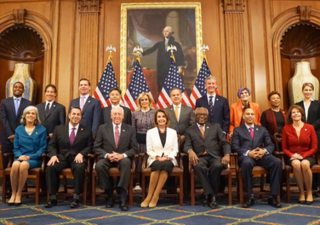
The New Democrat Coalition is a caucus in the House of Representatives of the United States Congress made up of Democrats, primarily liberals and centrists, who take a pro-business stance and a liberal-to-moderate approach to fiscal matters. Most members hold socially liberal views.

The Committee on Science, Space, and Technology is a committee of the United States House of Representatives. It has jurisdiction over non-defense federal scientific research and development. More specifically, the committee has complete jurisdiction over the following federal agencies: NASA, NSF, NIST, and the OSTP. The committee also has authority over R&D activities at the Department of Energy, the EPA, FAA, NOAA, the DOT, the NWS, the DHS and the U.S. Fire Administration.

The Congressional Hispanic Caucus (CHC) is an organization of 38 Democratic members of the United States Congress of Hispanic and Latino descent. The Caucus focuses on issues affecting Hispanics and Latinos in the United States. The CHC was founded in December 1976 as a legislative service organization of the United States House of Representatives. The CHC is organized as a Congressional Member organization, governed under the Rules of the U.S. House of Representatives.

The Republican Study Committee (RSC) is a congressional caucus of conservative members of the Republican Party in the United States House of Representatives. In November 2022, Representative Kevin Hern of Oklahoma was elected as the chair of the RSC, effective as of January 2023.
The Gang of Eight is a colloquial term for a set of eight leaders within the United States Congress who are briefed on classified intelligence matters by the executive branch. Specifically, the Gang of Eight includes the leaders of each of the two parties from both the Senate and House of Representatives, and the chairs and ranking minority members of both the Senate Committee and House Committee for intelligence as set forth by 50 U.S.C. § 3093(c)(2).

The Congressional Taiwan Caucus is a Congressional Member Organization in the United States Congress with 144 members. The caucus focuses exclusively on improving US–Taiwan relations.
The U.S. Congressional International Conservation Caucus, founded in September 2003, is a bipartisan congressional organization with the conviction that “the United States of America has the opportunity, the obligation and the interests to advance the conservation of natural resources for this and future generations,” and a commitment to promote U.S. leadership in public/private conservation partnerships worldwide.
The Republican Governance Group, originally the Tuesday Lunch Bunch and then the Tuesday Group until 2020, is a group of moderate Republicans in the United States House of Representatives. It was founded in 1994 in the wake of the Republican takeover of the House; the Republican House caucus came to be dominated by conservatives. It is considered a center to center-right congressional caucus, with its members primarily from competitive House districts.

The Congressional Ukraine Caucus is a bipartisan caucus of the United States House of Representatives that was announced in June 1997 in Washington, D.C., nearly six years after Ukraine declared its independence.

The Congressional Arts Caucus is a registered Congressional Member Organization for the US House of Representatives in the 115th Congress.
The U.S.–Japan Caucus is a bipartisan congressional member organization within the United States Congress made up of over 100 members of the United States House of Representatives who work to strengthen and maintain U.S.–Japanese relations.
The Expand Social Security Caucus is a congressional caucus in the United States House of Representatives and United States Senate, consisting of members that advocate for the expansion of Social Security. It has 19 members in the Senate and 115 in the House, all deriving from the democratic caucus’ of both chambers.

A leadership election was held by the United States House of Representatives Democratic Caucus before the beginning of the 116th United States Congress on January 3, 2019. The election determined who will be nominated by the caucus for the speakership election as well as who would occupy other leadership positions within the House Democratic Caucus. The following positions were nominated or elected on November 29: Speaker of the U.S. House of Representatives, House Majority Leader, House Majority Whip, House Assistant Majority Leader, Democratic Caucus Chair, and Democratic Caucus Vice Chair. The Democratic Congressional Campaign Committee Chair, the Policy and Communications Committee's Chair and its three Co-Chairs, Junior Caucus Representative and Freshman Class Representative were elected the next day, and a third co-chair was added to the Steering and Policy Committee by the Leader.
Future Forum is a generational caucus of Millennial and Gen Z members of Congress serving in the U.S. House of Representatives. The organization was founded in April 2015 by Representative Eric Swalwell. The caucus consists of 53 Members of Congress who represent congressional districts across the country. Future Forum's co-chairs are Representatives Colin Allred, Brittany Pettersen, Darren Soto, and Haley Stevens.

The count of the Electoral College ballots during a joint session of the 117th United States Congress, pursuant to the Electoral Count Act, on January 6–7, 2021, was held as the final step to confirm then President-elect Joe Biden's victory in the 2020 presidential election over incumbent President Donald Trump.
The Conservative Climate Caucus is a caucus within the United States House of Representatives composed of 81 members, all of the Republican Party. Its founder and first chairman was U.S. Senator John Curtis (R-Utah) during the 117th United States Congress in 2021. The caucus's self-declared purpose is to "Educate House Republicans on climate policies and legislation consistent with conservative values".

The 119th United States Congress is the current term of the legislative branch of the United States federal government, composed of the United States Senate and the United States House of Representatives. It convened on January 3, 2025, during the final 17 days of Joe Biden's presidency, and the first two years of Donald Trump's second presidency.









